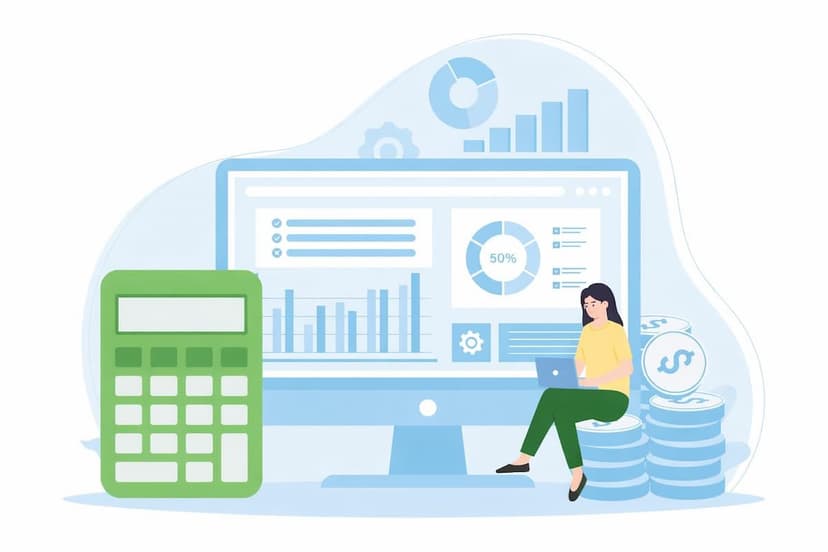10 Essential Characteristics of a Good Bookkeeper

A book keeper plays an important role in a business. Their job is to ensure that all transactions are properly recorded, organized and prepared for financial reporting. Depending on the size of the organization, bookkeepers may have other responsibilities.
Many business owners are unclear about the bookkeeper role, bookkeeper required skills and what to look for when hiring one. What does it take to be a bookkeeper? What traits should they have?
Let’s explore some essential characteristics of a good bookkeeper to help you with the hiring process.
What Makes a Good Bookkeeper?
What qualities make a good accountant or bookkeeper? What are bookkeeping skills and the qualifications of a bookkeeper? Let's look at some of the traits and skills that every bookkeeper should have to excel in their career.
1. Detail Oriented
A bookkeeper must be detail-oriented. In fact, this is one of the most important skills for bookkeeping. Why? Overlooking a minor detail can have catastrophic consequences when it comes to a business’s finances. A misplaced comma or mistaking one number for another can throw a company’s finances for a loop.
Being detail-oriented is one of the skills of a bookkeeper that you cannot compromise on. Once your bookkeeper becomes familiar with your business and its operations, they will find it much easier to detect patterns in your financial records, which can help prevent mistakes.
2. Knowledgeable
Knowledge is also one of the most important bookkeeping skills. A bookkeeper must be knowledgeable of the industry’s best practices and also understand how they apply to your specific industry.
In addition to basic knowledge skills for bookkeeper, they should also be able to track your organization’s financial progress, compare your progress to your competitors and report on trends and differences.
Knowledge, of course, goes beyond the industry’s best practices. Among the many skills needed for bookkeeping, they should also stay up to date on advancements in technology that they might be using in their day-to-day activities.
3. Trustworthy
When people enter this career, one of the first questions they ask are:
- How do I learn how to be a good bookkeeper?
- What do I need to be a bookkeeper?
Knowledge is certainly important, but there’s one trait that may be even more important: trustworthiness.
Skills can be learned, but trustworthiness is a difficult skill to develop and master.
As a business, you look for trustworthiness when hiring anyone, but this trait is one of the top bookkeeper skills needed because these individuals are managing your financials.
Your bookkeeper will have access to important and sensitive information that must be kept confidential. Businesses have a legal obligation to keep customer information private, so choosing an untrustworthy bookkeeper could have dire consequences for your organization.
How do you test a bookkeeper's trustworthiness? Start with the interview process. Present different scenarios and ask what they would do in these situations. Additionally, you should consider the individual’s reputation. Contacting their references can give you an idea of their trustworthiness.
4. Organized
Another one of the top bookkeeper skills is organization. Organization is one of the most important skills needed to be a bookkeeper because it ensures accurate and timely reporting.
Ideally, your bookkeeper should have an established and successful system for preparing reports, interpreting financial data and storing files.
Without proper organization, bookkeeping can quickly become chaotic, and the risk of errors skyrockets.
5. Client-centric
Being client-centric is one of the most important soft book keeping skills. Quality bookkeeping is about more than just numbers. It’s also about having a good perspective on client relationships and customer service.
Your bookkeeper should understand your business and take a proactive approach to their work. Regular communication and quick responses to questions can help ensure that your business stays on the right track from a financial standpoint.
6. Data-entry
Modern bookkeepers should have excellent data entry and technology skills. Today, most businesses rely on cloud-based accounting software for their bookkeeping needs. Some of the most common solutions include QuickBooks and Xero, but bookkeepers should also know how to work with Excel, PowerPoint and Word.
Your bookkeeper should know how to use these programs to their full advantage. While technology helps improve efficiency and accuracy, bookkeepers should still have data entry skills.
7. Communication
One of the skills that go unappreciated in many professions is communication. Bookkeeping demands strong communication skills that allow them to relay information to you in a clear, concise manner.
Additionally, these professionals need to adapt to the times, meaning that they should be able to be reached via email, phone, Zoom calls, in-person and more.
If you have an issue with your books or there’s a time-sensitive matter that you need to be solved, a bookkeeper who is a good communicator will provide you with the best service possible. Ask your bookkeeper about the ways that you can communicate with them before signing any contracts with them.
8. Problem-solving
Why do you hire an accountant or book keeper? Because they know how to review numbers and ensure accuracy. A good bookkeeper is a problem-solver who will:
- Identify errors in your books
- Analyze discrepancies in invoices, payroll, etc.
- Find rapid solutions to any book-related problems you have
If your bookkeeper doesn’t solve problems for you quickly, they lack an essential trait that you need for a long-term business relationship.
9. Ability to See the Big Picture
Is it hard to be a bookkeeper? Sure. These professionals need to have a keen ability to “see the big picture.” Numbers tell the story of your business’ operations, and a good bookkeeper will be able to explain how your decisions impact your business.
Seeing the big picture also means analyzing your business’ operations, deciding on the best course of action and helping you envision the future of your operations.
If your bookkeeper isn’t spending time helping your business grow by reviewing the numbers, they might not see the big picture in a way that your company needs to exceed expectations.
10. Flexibility
Finding a good bookkeeper is difficult, and you should do everything that you can to make the experience as easy as possible for them. One characteristic you need to look for in a book keeper is flexibility.
A career as a bookkeeper is versatile because the business landscape is always evolving.
Bookkeepers can be flexible in a few ways:
- Listen to clients and understand their problems
- Find new, exciting ways to assist clients
- Help you through difficult times in business
If your bookkeeper is not flexible, you may need to find one that is flexible. You can and should build long-term relationships with these professionals because they’re integral to your operations.
Last Word on the Best Traits of a Bookkeeper
As a business, you don’t know how to find a good bookkeeper the first time you look for one. If you’re comparing professionals to find one that is good for your company, consider asking friends for referrals, reading through reviews and meeting with the expert in person.
Your first meeting with a bookkeeper will be very insightful.
It's important that the professional meets your needs in both personality, drive and business. If you don’t have a good feeling about the person or just don’t like the way that they conduct business, move on to the next person until you find someone that you trust to manage your books.

How to Calculate Free Cash Flow (FCF): Formulas + Real Examples
Read more

The 3 Types of Cash Flow: What They Mean and Why They Matter
Read more

Cash Flow Forecasting Template
Read more

Your Guide To Financial Metrics And KPIs
Read more

10 Cash Management Trends for 2026
Read more

10 Best Cash Flow Business Ideas: Build Income That Counts
Read more
FAQ
Trusted by thousands of business owners
Start Free Trial Now